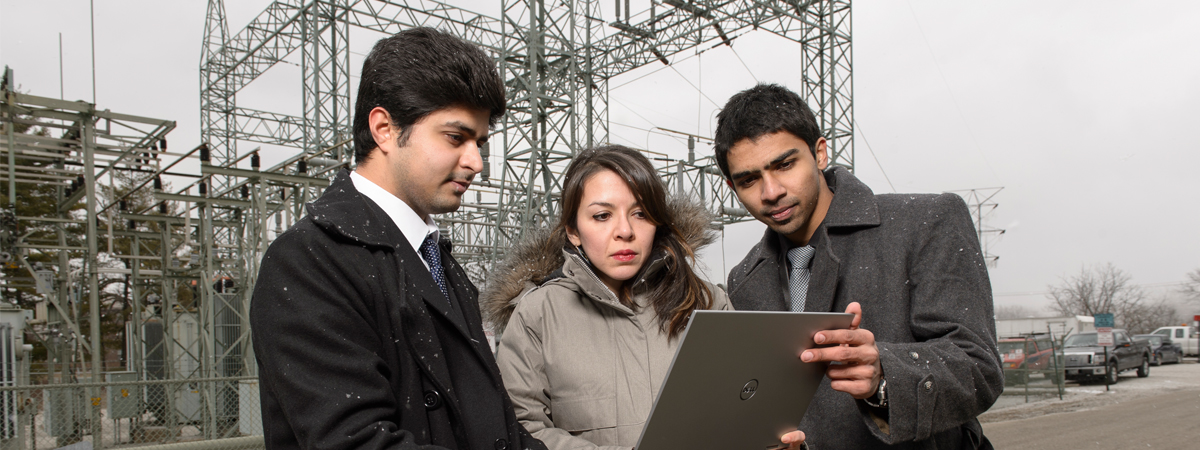Keeping the lights on through the storm
Keeping the lights on through the storm
| Author: | William Meiners |
|---|---|
| Magazine Section: | Our People, Our Culture |
| College or School: | CoE |
| Article Type: | Issue Feature |
| Page CSS: | #article-banner { background-position: center 15% !important;} |
| Feature Intro: | New Purdue professor examines inadequacies in the predictability of power grid performance. |
Whenever a disaster, manmade or otherwise, strikes a community, power outages over large areas can further contribute to the potentially devastating effects that could delay that community's recovery. With high-impact weather events on the rise due to global warming, Purdue's Roshanak Nateghi is using mathematical models to determine how to better predict the power grid's reliability within specific locations of the United States.
Nateghi, assistant professor of industrial engineering with a dual appointment in Environmental and Ecological Engineering, was the first author on a January article in Risk Analysis titled "Critical Assessment of the Foundations of Power Transmission and Distribution Reliability Metrics and Standards." Nateghi used data from research pulled during her PhD days at Johns Hopkins University and worked with engineers, climatologists and geographers to determine how utility companies can better predict the effects of the seeming randomness of extreme weather events. They also examined the existing national and state regulations and standards for ensuring the reliability and resiliency of the U.S. electric power systems.
Looking at low-probability, high-impact events
From her East Coast base at Johns Hopkins, Nateghi and her team looked extensively at the impact of hurricanes on the reliability of power distribution systems. "We developed a series of models that can help a utility company predict the number of outages at a geographically fine scale before a hurricane makes landfall," she says. "We can estimate outage locations, as well as outage durations and the percentage of customers left without power."

When the National Hurricane Center begins tracking a particular storm, a local utility company can run those models to predict the related outages. Now outside of hurricane paths, Nateghi, drawn to Purdue for the dual appointment and the chance for Discovery Park collaborations, is paying particular attention to Midwestern snowstorms and tornadoes.
As Nateghi began developing the mathematical models, she was surprised to learn that the impact of extreme events was not captured in the reliability calculations. Though the bulk power system is regulated at the federal level, the distribution system is regulated at the state level. One problem, she says, is that “neither adequately captures the impact of low-probability, high-impact events and does not paint a complete picture of the risk.
"We have made considerable advances in bolstering power systems reliability during normal operation, but much work is needed during the impact of extreme events," Nateghi says. "The way we currently conceptualize the reliability of the grid does not map well onto the consumers' expectations."
In the Risk Analysis article, researchers pointed out several shortcomings of current measures, including the variability of reliability of metrics and standards used across states; the reporting of average system-wide indices; the exclusion of major events; a lack of national performance accountability; and the lack of all metrics for key aspects of reliability.
"Data from the Department of Energy tells us that the frequency and intensity of extreme weather events are increasing," Nateghi says. "So it's even more worrisome that the extreme impact events are not captured within reliability calculations."
Capturing uncertainty for proactive solutions
Nateghi believes the lack of appetite for predictive models may be reflective of a generalized attitude toward reliability and resilience of the U.S. infrastructure. "It's very reactive as opposed to proactive," she says. "Instead of trying to anticipate future events, we simply analyze the past, react to current events and move on. Many argue that the costs of improved grid reliability are very high, but the costs of repeated customer interruptions and system repairs can be far greater. There can definitely be great value in investing in grid upgrades and adopting a proactive risk management approach."
An industrial engineer with an eye on environmental solutions, Nateghi came to her particular field through mechanical engineering studies as an undergraduate. Learning about the effects of fossil fuels on climate change, she turned to environmental engineering for graduate studies.

Unlike the "wet side" researchers, who work on process-focused things in labs, Nateghi has always been among the "dry side" engineers stationed at computers. "I was more interested in looking at large-scale systems, examining infrastructures as a whole," she says.
In what she hopes will continue to be the best of both research worlds, Nateghi is working with two master's students to determine the ongoing performance of the power grid. "Part of that is predicting load growth by using non-deterministic methods," she says. "These are methods that actually capture the uncertainty. Beyond the traditional methods used for the forecast of load growth levels, we incorporate factors like climate change and land-use change."
The goal, of course, is to help ensure fewer power outages and promote the reliability and resiliency of the power grid. The research shows that communities could do much in the area of emergency preparedness, for example, by trimming back tree limbs that could tear down power lines. Policymakers could likewise take a proactive approach, perhaps encouraging utility companies through incentive programs to minimize the damage they hope never arrives.
Many experts on hand could also pay dividends on the discovery front. "Certainly the interdependency between our power grid and almost every aspect of our lives makes this work even more critical," Nateghi says. "We want to make sure that the power stays on."

Comments